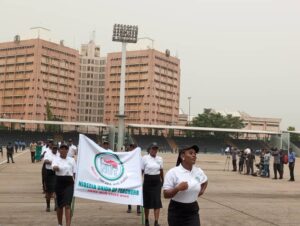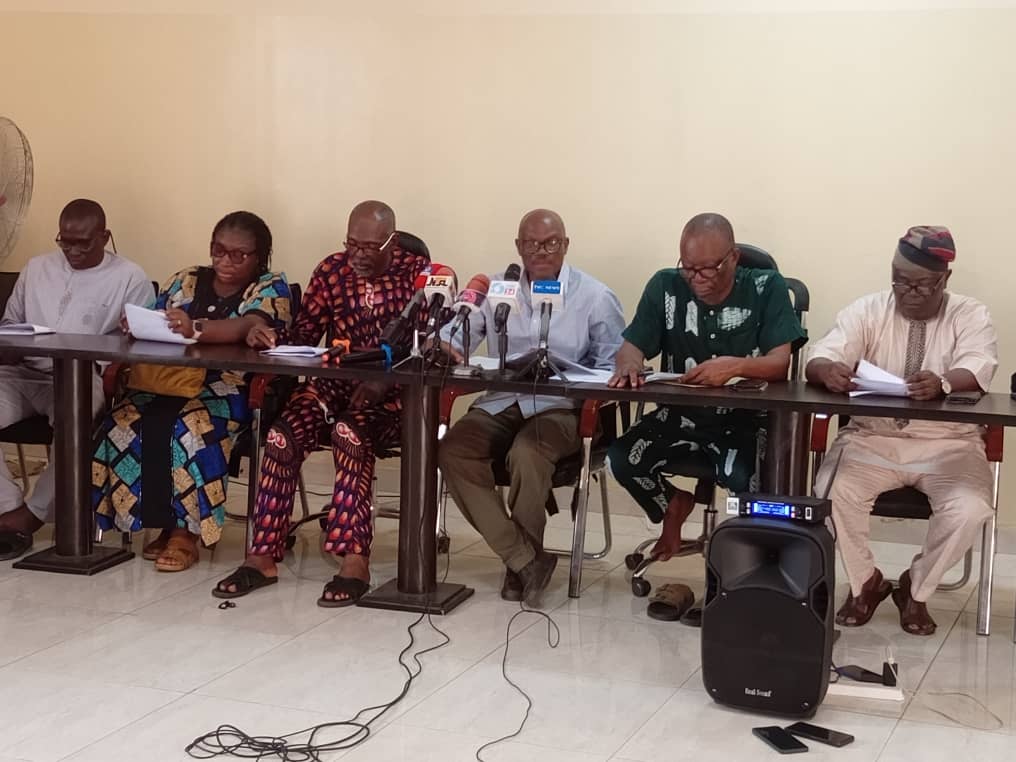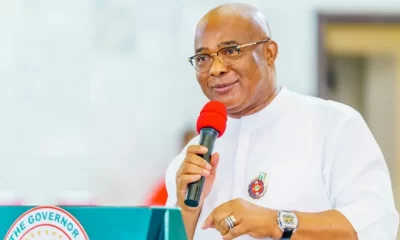Education
FG committed to reposition teaching profession – Mamman

As Nigeria today joins the world to commemorate the 2023 World Teachers’ Day celebration, teachers have been advised to be appreciative of efforts by the Federal Government to reposition the teaching profession.
The Minister of Education, Tahir Mamman at the 2023 commemoration in Abuja on Thursday,said the day is set aside to honour teachers for their invaluable roles in the development of humanity and society.
The theme for this year’s commemorate is : “The teachers we need for the Education we want: Global imperative to reverse teachers shortage.
”Mamman said some of the promises made to teachers had been fulfilled as they can now retire at either 65 years of age or 40 years of service; whichever that comes first.
He added that teachers’ salary had since been placed on the first line charge for timely payment.
“Today, we have come together not merely as individuals but as a global community to celebrate the unsung heroes of our society. World Teachers Day is not just an annual observance but a testament to the transformative power of education and the dedication of those who facilitate it.
“As we embark on this event with the theme “The Teacher We Need for the Education We Want: The Global Trend to Reverse the Teacher Shortage” let us reflect on the impediments that teachers encounter while instilling knowledge, values, and hope.
“We have to re-evaluate our approach to teacher training, recruitment, welfare and equip teachers with the skills, resources and the recognition they deserve to meet the evolving demands of education in the 21st century.
“It is, therefore, paramount that while reaffirming the importance of their invaluable role in shaping a brighter tomorrow every year, there is dire need to clear the hurdles that prevents the optimal realisation of their roles and targets,” he said.
Mamman explained that the travail of educating young minds goes beyond the confines of the classroom.
According to him, it is a continuous effort to inspire, motivate and guide students towards their full potential.
“Teachers should note that their words resonate deeply with their students and pupils thereby reaffirming the importance of the educator’s role in nurturing creativity or cluelessness and curiosity or apathy.
“We all know that teaching is more than imparting knowledge and involves instilling a lifelong love for learning, character building, inducting positive attitude and general relationship with people outside the classroom.
“All these are informally transmitted through the teachers conduct.
“As we celebrate teachers today, there is need for teachers in Nigeria to be appreciative of efforts by the Federal Government to reposition the teaching profession,” he said .
Meanwhile, the Minister of State for Education, Yusuf Sununu, explained that shortage of teachers in the country and in other parts of the world poises challenges.
Sununu said that it was time to reflect on the critical role teacher’s played by instilling knowledge, values, a thirst for learning in their students to transform them into responsible citizens.
“If all equipped teachers are passionate and ready to pursue excellence, the teachers we have in our schools can collectively revolutionise the basic and secondary education sub-sectors.
“In Nigeria, as in many other countries worldwide, the shortage of qualified teachers and the desired form of education pose a significant challenge.
“Ongoing international deliberations recommend changes that anchor on commitment, connections, communication and creativity in the prevailing traditional education methodology.
“Therefore, education is in a critical juncture and teachers in service require constant training and retraining to fit into the scheme of things.
“The teacher we want shall be creative, active listener, engaging, collaborative and has empathy. He also must be adaptive, focused on growth, patience, respectful and prepared to engage in lifelong learning,”he said.
Sununu added that the inability of some teachers who may be computer literate but unable to deploy Information and Communication Technology (ICT) in teaching and learning affects education outcome and the ability to achieve national development goals.
“It is, therefore, imperative that teachers in Nigeria should take advantage of the Open Education Resource (OER) and other online and in-person study centres to upgrade and become “the teachers we want”.
“This is for us to collectively ensure that every child in Nigeria has access to quality education,” he said.
The celebration witnessed match pass by teachers across the 36 states, including the Federal Capital Territory (FCT) as well as presentation of President’s Teachers and Schools Excellence Awards.
Omolade Adeyemi, a teacher from the SUBEB Model Primary School, Ekiti came best in the public school categories, while St. Paul Academy, Jos is the best school in the private school categories.
Ijeoma Ekumankama of the Federal Government College, Nise, Anambra, is the Best Principal, Best Teacher in the Private School Categories is Ruth Oraekwu, Best Administrator in the Public Category is Oladimeji Bello, among others.
Education
We will Capture Out-of-school Children in Our Education Programmes – Enugu Govt

The Enugu State Commissioner for Education, Prof Ndubueze Mbah We will Capture Out-of-school Children in Our Education Programmes – Enugu Govt says the state government will redouble efforts to capture out-of-school children in its programme.
The commissioner gave the assurance on Tuesday in Enugu during the celebration of the 2025 Children’s Day held at the Nnamdi Azikiwe Stadium, Enugu.
Mbah said that the state was working in collaboration with community and faith- based institutions to ensure that no child was neglected or forgotten.
He encouraged them to be calm as they were not forgotten noting that they would be remembered through inclusive education programmes.
Mbah said that education was their right adding that the present administration was committed to making it a reality for them.
He, however, said that every child irrespective of status, gender, location or ability was valued and their welfare would be taken into consideration.
He said that they deserved to grow in a safe, nurturing environment with opportunities to dream and become successful as this administration would continue to protect their rights, well-being, and empower them through education, healthcare, and innovation.
“As we celebrate international children’s day today, remember that you are the leaders of tomorrow.
“Let your voices be heard, your talents be seen, and your dreams shall come through.
“To our school children, we commend your efforts, resilience, and passion for learning. You are the builders of the Enugu State.
“Government investments in smart schools, teacher training, digital tools, and innovation are for you to be equipped with skills for a future that has already begun,” he said.
In the same vein, the Secretary to Enugu State Government, Prof. Chidiebere Onyia, encouraged every child in the state to remain focused and work hard to attain their desired goal.
Onyia said that with the introduction of Smart Schools in 260 political wards of the state, every child in the state would soon compete with their counterparts globally.
He emphasised that the administration had investment heavily in education sector to ensure that both privileged and non privileged children are equipped with basic skills and knowledge.
The event featured march past by various public and private primary and secondary schools in the state. (NAN)
Education
Strike Looms as ASUU Accuses FG of Endless Agreement Negotiations, Others

By David Torough, Abuja
The Academic Staff Union of Universities (ASUU) has once again raised the alarm over the Federal Government’s persistent failure to honour past agreements, warning that another nationwide strike may be imminent.
ASUU’s new President, Professor Chris Piwuna, at a press conference in Abuja on Friday criticised the government’s inaction on critical issues affecting Nigerian universities.
Piwuna demanded the immediate implementation of all Memoranda of Understanding (MoUs) and Memoranda of Action (MoAs) signed since 2013.
ASUU emphasised that fixing Nigeria requires fixing its universities, which are plagued by poor funding, stalled agreements and government neglect.
The Union also demanded the release of withheld salaries from the 2022 strike and payment to lecturers on part-time and sabbatical appointments affected by the IPPIS payroll system, while condemning political interference in university administration, unlawful appointments, and the undermining of institutional independence.
It further called for an education summit, proper implementation of past agreements, and a stop to the misuse of TETFund resources. It warned it will not remain passive while its members’ rights are trampled.
ASUU urged the government to resolve all outstanding issues to avoid further disruption. While open to dialogue, the union signaled potential industrial action if demands are ignored, reaffirming its commitment to the struggle for quality education.
“Almost three decades since Nigeria’s return to civilian governance, it is not yet Uhuru. The country is still pathetically trapped in the web of multifaceted political malfeasance graphically sign-posted by prebendal politics, mindless manipulation of electoral processes, brazen nepotism, and deliberate subversion of people’s will at every level of governance.
“The sum total of all these is that transparency and accountability have become rare commodities in the hands of the managers of the Nigerian state. Consequently, the generality of citizenry have become despondent, having lost hope and faith in government and its agencies.
“If given the desired attention, Nigeria’s universities should provide the solution ground to solving its multi-faceted and multi-dimensional problems. ASUU has remained focused in the struggle for improved funding and revitalization of these institutions.
“A starting point to achieve this noble goal is to prevail on government to address all outstanding issues in our previous engagements. This will create a conducive atmosphere for addressing the welfare issues of Nigerian academics for the optimal discharge of their statutory responsibilities as the think-tank of the country and mentors for future leaders in all aspects of national development. ASUU remains open to discussion in this respect.
“However, the Union would not continue to look helpless while the rights of its members are being trampled upon and washed away with reckless abandon.”
ASUU stated that the level of implementation of the 2009 FGN/ASUU Agreement is not encouraging, saying that although a few issues are partially implemented, many remain unaddressed.
These, it said include the conclusion of the renegotiation of the 2009 Agreement based on the Nimi Briggs Committee’s draft agreement of 2021; release of withheld three-and-a-half months’ salaries due to the 2022 strike; release of unpaid salaries for staff on sabbatical, part-time, and adjunct appointments affected by the Integrated Payroll and Personnel Information System (IPPIS); release of outstanding third-party deductions such as check-off dues and cooperative contributions; funding for the revitalization of public universities; payment of Earned Academic Allowances (EAA); concerns over the proliferation of universities by federal and state governments; non-constitution of some universities’ governing councils; and adoption of the University Transparency and Accountability Solution (UTAS) in place of IPPIS.
It noted that the government agreed to mainstream the EAA into salaries with the creation of an irregular allowance as a budget line in the 2026 Budget, after releasing N50 billion for the backlog and budgeting N29 billion for the payment of 2025 Earned Academic Allowances and agreed to release N150 billion as a revitalisation fund within four weeks from April 2025.
“However, we are still waiting for government to fulfil these promises. The Union has also reached an understanding with the Yayale Ahmed-led Committee, following the review of the report of the Nimi Briggs-led FGN-ASUU Renegotiation Committee in December 2024. Again, ASUU members have been left in limbo, waiting for the signing of an agreement five months after.
“Delegates at the UNIBEN National Delegates Conference exhaustively evaluated the government’s disposition in resolving outstanding issues with the Union and expressed regrets that nothing has significantly changed in the last two years.
“The irreducible minimum that can guarantee industrial harmony in the Nigerian University System (NUS) is for government to speedily address all outstanding issues including conclusion of the renegotiation of the 2009 FGN/ASUU Agreement, payment of the withheld three-and-a-half months’ salaries, release of the backlog of promotion arrears, payment of withheld salaries of sabbatical and part-time lecturers on account of not signing into the discredited IPPIS, and addressing the unjust victimization of ASUU leaders and members in some state universities.
“Beyond these, we demand a faithful implementation of all issues arising from our previous Memoranda of Understanding (MoUs) and Memoranda of Action (MoAs) government signed with ASUU since 2013.”
ASUU also called on state governors and visitors to these universities to, without further hesitation, resolve lingering issues and reinstate its members without delay in the interest of justice and industrial peace.
On the erosion of university autonomy, the union expressed deep concern. “ome recent developments in Nigeria’s public universities are of grave concern to our Union. We are discomfited by the ongoing attempts to completely erode the autonomy of public universities by the political class and the bureaucrats.”
community
UTME: JAMB To Hold Additional Mop-up Exam for Absent Candidates

Joint Admissions and Matriculation Board (JAMB) says it will conduct additional mop-up examinations for candidates who missed the 2025 Unified Tertiary Matriculation Examination (UTME).
JAMB Registrar, Prof. Is-haq Oloyede, stated this on Wednesday in Abuja at a meeting with key stakeholders to address the challenges encountered during the 2025 UTME.
Oloyede said that the board would accommodate the estimated 5.
6 per cent of candidates who missed the examination by organising a special mop-up exercise.He said that the board had extended the opportunity to all the affected candidates, regardless of the reasons for their absence.
“Normally, we hold one mop-up nationwide for those with one issue or the other.
“But this time, we are creating a new mop-up. Even those who missed the earlier examination due to absence, we will extend this opportunity to them.
“It is not that we are doing something extraordinary; in class, you make up an examination when students miss it for one reason or the other; we just don’t allow abuse of that.
“So we will allow all the candidates who missed the main examination for any reason to take part in this mop-up,” he said.
Oloyede criticised some public commentators who misunderstood and misrepresented the role of UTME, while clarifying that UTME was a placement test and not an achievement test.
According to him, the purpose of the examination is to rank candidates for available spaces in institutions and not to measure intelligence or overall academic potential.
The registrar further stated that high UTME score was not the sole determinant of admission, adding that combined performance, including post-UTME scores and school assessments, could significantly affect a candidate’s ranking.
While acknowledging the emotional strain experienced while announcing the UTME results, he noted that this was not indicative of an institutional weakness.
He expressed JAMB’s commitment to resolving issues affecting the examination process, even as he rejected comments suggesting that the administrative failure was due to incompetence or ethnic bias.
“I want to say this clearly, particularly because I accepted responsibility, not because I do not know how to do the work.
“I say it for the fourth time that no conspiracy theory is relevant to this case.
“Something happened; like people who have been doing something well for years and something just went wrong. That I should now throw them under the bus? No,” he said.
Oloyede, who frowned at those exploiting difficulties to promote ethnic or conspiracy-driven narratives, urged stakeholders to stop ethnic profiling in the education sector.
According to him, many of the criticisms of JAMB’s operations are rooted in ignorance.
The registrar, however, commended his team’s efforts, while also appreciating the resilience shown by candidates, many of whom, he said, had continued their exams, notwithstanding the various challenges. (NAN)




















